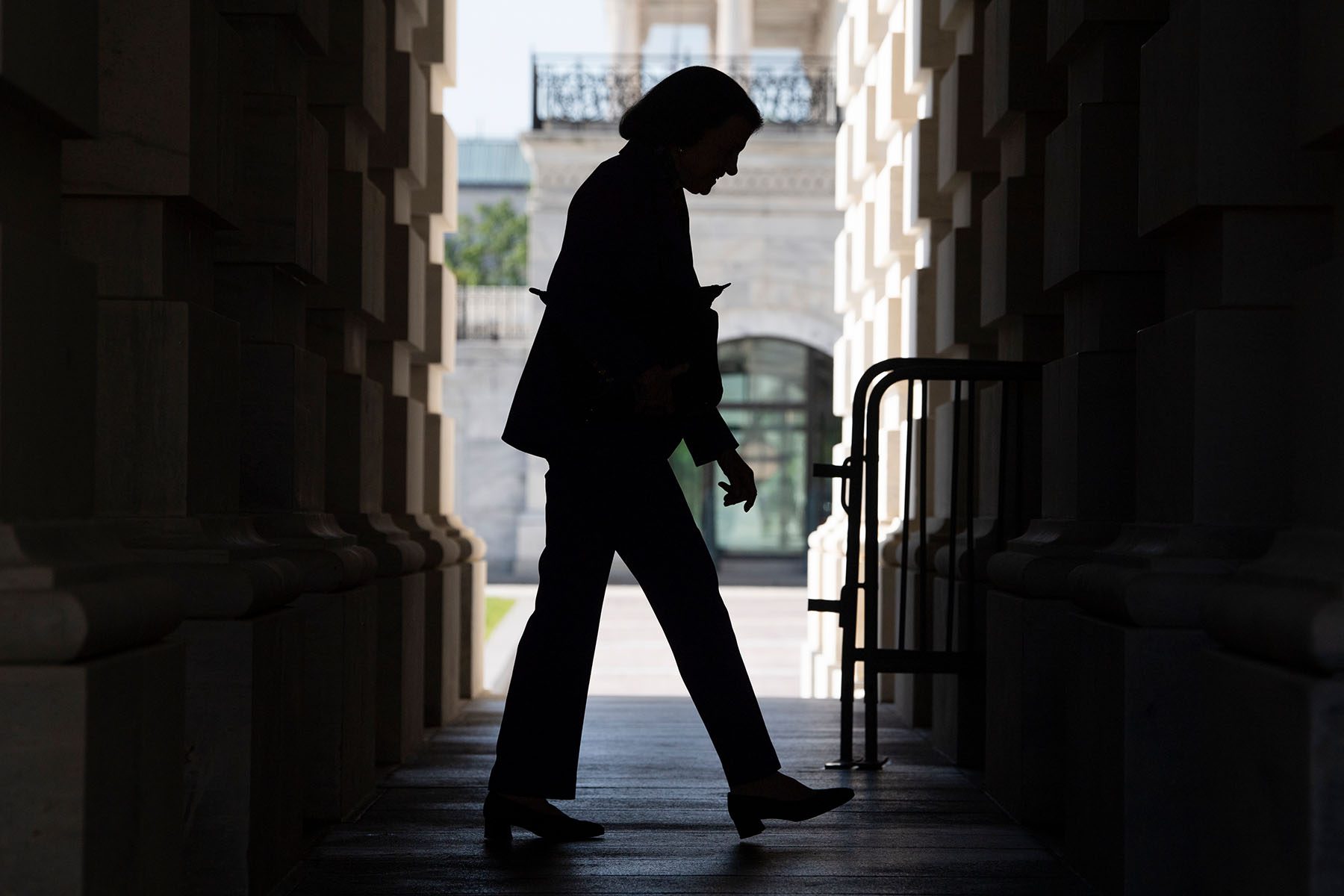Over the past couple of years, there has been a stream of reporting and rumors about the mental capacity of Sen. Dianne Feinstein, who at 88, is currently one of the oldest members of Congress. Most recently, multiple colleagues told the San Francisco Chronicle that they no longer believe Feinstein is fit to serve, with one saying the senator forgot who they were multiple times during a conversation.
In a phone call, Feinstein told the San Francisco Chronicle’s editorial board that she had not heard concerns about her cognitive ability directly. “I’m not isolated. I see people. My attendance is good. I put in the hours … And so I’m rather puzzled by this,” she said. Feinstein’s office did not respond to a request for comment from The 19th.
Regardless of her capacity, the reporting has raised questions about Feinstein and retirement once again. Feinstein still has two years left to her term and told the San Francisco Chronicle she intends to complete it. She has not yet said whether she will run again in 2024.
Most Americans who continue working past the traditional retirement age of 65, when people qualify for Medicare benefits, do so because they cannot afford to stop. In an AARP survey of older adults from 2018, money was cited as one of the most common reasons respondents put off retirement. This is not an issue for Feinstein: The website Open Secrets, which tracks money in politics, estimates that Feinstein is the second wealthiest person in the Senate.
Concerns about the cognitive capacity of elected officials are not new. In 1996, Kevin Sack wrote in The New York Times about then 93-year-old Senator Strom Thurmond’s seeming confusion during a speech. Thurmond went on to serve seven more years, until his death at 100 years old. Similar concerns were raised about Senator Robert Byrd before his death in office at 93.
But experts say that Feinstein choosing to stay in the Senate well into her 80s could be making up for lost time in the political sphere. Women in politics like Feinstein face unique practical challenges involving family life and perceived competence.
Women in politics have historically started their careers later than men. “The gendered expectation is that you need to be home with your children,” said Suzanne Chod, a professor of political science at North Central College who focuses on women in American politics. House Speaker Nancy Pelosi, for example, didn’t run for office until her youngest child had left for college. She was 47 years old. Pelosi is currently 82 and while she has faced accusations of dementia, the attacks come more or less exclusively from the political right.
Women in the Senate “have a lot they want to accomplish,” Chod said. “ … By the time they get in and they’ve worked a few years, by the time they get reelected and develop institutional memory, by the time they build up seniority, they’re going to be older.”
Expectations for women candidates are also higher. They may need to accomplish more before being encouraged to run for office — much less be successful in winning office, experts said. That can mean they are older when they run for — and win — office.
“For women, to run a successful campaign, they are evaluated differently. Even when she’s [been elected] she has to work twice as hard to be seen as half as qualified,” Chod told The 19th.
In 1991, the median age for a U.S. senator was 56.5. After a surge of women joined Congress in the 1992 election, that number jumped to 58. Chod attributes some of that change to the influx of women that year. Feinstein first ran for national office in 1992, when she was 59 years old. Her children had all finished school by then.
Things are changing for women in politics. In 2018, a small group of women members of Congress founded an informal Moms in the House caucus. That same year, Sen. Tammy Duckworth became the first woman senator to give birth while in office. Currently, 25 members of Congress are women with school-age children. On average, however, women are still older than men in the Senate, House of Representatives and at the state level, according to Represent Women, a nonprofit seeking parity for women in politics.

Concerns over Feinstein’s capacity could also be related to something outside of the senator herself: Society has a tendency to judge older adults more harshly, particularly women, experts said.
“One of the central tenets of ageism is that we tend to over-exaggerate cognitive decline. Older adults are held to an absurd standard where any gaffe suddenly becomes a marker of dementing disease,” said Kim Gorgens, a professor of neuroscience at University of Denver.
“It’s harder for women to display any obvious vulnerability,” Gorgens said. The way Feinstein has been discussed in media “raises [Gorgen’s] hackles up.”
An AARP survey from last year found that 78 percent of older workers said they had seen or experienced discrimination based on age. In another survey conducted by Resume Builder, 80 percent of hiring managers reported having concerns about workers over the age of 60.
But letting go of work for older adults can also be tied to keeping a sense of self.
“Work gives people an identity,” said Mick Smyer, professor emeritus of psychology at Bucknell University and an expert on aging. “When you go to a gathering and meet somebody new, the first question is ‘what do you do?’”
Smyer cites bias against older adults as a reason someone like Feinstein may choose to continue working. “It’s not fear of aging as much as fear of ageism. If you’re above a certain age, you get invisible pretty quickly,” he said.
Work doesn’t just shape our sense of who we are. It may also impact our health, according to Gorgens. A large 2015 study from the Centers for Disease Control and Prevention journal Preventing Chronic Disease found working adults over 65 had better outcomes across all health status measures, compared with retired or unemployed older adults. It isn’t clear that the link between work and good health is causal, but “it’s more predictive of good health outcomes than most other variables,” Gorgens said.
According to Gorgens, Americans need to rethink the role of work for seniors. “From a healthy aging perspective, there’s been an entire paradigm shift. You need to normalize employment of older adults and the continuation of careers well into later adulthood,” she told The 19th.
Gorgens also pointed out that dementia, and neurology in general, is less understood in women. “There’s less research on [women with] dementia, even though we are more likely to get it,” she told The 19th. Organ and tissue samples from brain banks are overwhelmingly male, for example. “Particularly with dementing disease, we know more about women as caregivers than as patients,” she said.
Still, Gorgens acknowledges the risk older adults with dementia may play working in roles that may have life-or-death consequences. Gorgens gave air traffic controllers, surgeons and elected officials as examples. “What kind of oversight should there be to ensure that someone’s cognitive capacity is up to the task at hand?” she said.







